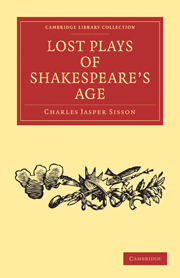Chapter II - PLAYS FROM THE LONDON STAGE
Published online by Cambridge University Press: 05 July 2011
Summary
A LOST PLAY
George Chapman was already known in 1598 as a master of both comedy and tragedy, as well as a poet who could darken counsel in verse which made its exclusive appeal to the intellectuals of his time. He had, in that year, gained fresh laurels, this time in general estimation, by that famous translation of Homer which, two hundred years after, was to reveal a new world of poetry to Keats. And he had shown his versatility, and his devotion to a young dead poet who had moved in his own circle of friends, in his completion of Marlowe's unfinished Hero and Leander, also printed in 1598. But if Chapman's poetry has been preserved in print, most of those early plays which won him renown have disappeared.
Henslowe records five plays of his in the years 1598–9 of which none has survived, unless The World runs on Wheels is a first version of All Fools. The loss is disastrous, and it is felt more deeply in days when the greatness of Chapman is becoming more fully realized. There is therefore an especial interest in whatever can furnish some measure of compensation for the vanished ‘tragedy of Bengemens plotte’ that Chapman wrote for Henslowe upon a scenario prepared by Ben Jonson, or the pastoral tragedy of 1599 that would have shown us a Chapman engaged upon pure poetry in dramatic form, innocent of Stoic philosophy, an unknown Chapman indeed.
- Type
- Chapter
- Information
- Lost Plays of Shakespeare's Age , pp. 12 - 124Publisher: Cambridge University PressPrint publication year: 2009First published in: 1936



